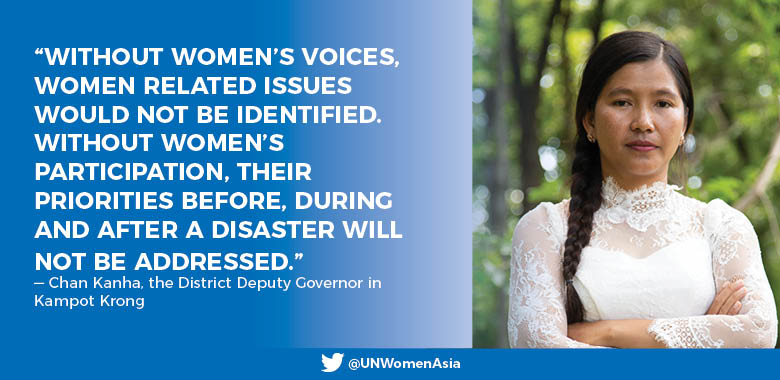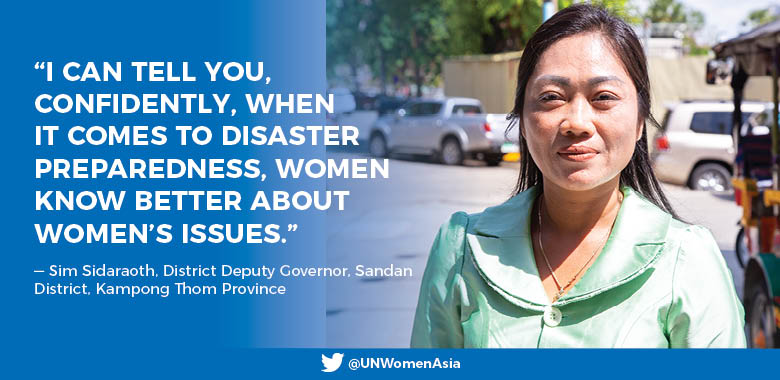Stepping in: Women must lead in dealing with natural disasters in Cambodia
Date:
Authors: Sereyroth Lim and Timothy Jenkins

Phnom Penh, Cambodia — Chan Kanha will never forget the rainy season of 2016.
“Livestock and rice fields of villagers were damaged,” recalled Kanha, “but the drowning death of a 7 year-old girl was heart-breaking for me.”
The girl’s death brought grief to the community in Kampot, the southern Cambodia city where Kanha is Deputy District Governor.
When a disaster hits, boys and girls, and men and women have distinct vulnerabilities, and this shapes the way the experience and recover from a disaster. One such vulnerability is gender inequality.
Women make up more than half of the population of Cambodia. But when it comes to preparing for and responding to disaster, they are disproportionately underrepresented in leadership positions.
During a disaster, inequalities between men and women reveal themselves in the most frightening ways. In countries where gender inequality is pervasive, the percentage of women and girls who die is much higher, as are rates of gender-based violence including rape, human trafficking and domestic abuse.
“Women are agents of change and their participation in disaster risk reduction is a women’s rights issue--a core principle of CEDAW,” said Khun Sophea, Programme Analyst at UN Women Cambodia.
CEDAW is the United Nations’ Convention on the Elimination of Discrimination against Women, to which the Royal Government of Cambodia is a party.

In Cambodia, women comprise 51 per cent of the primary workforce in subsistence agriculture and 57 per cent of the workforce in market-oriented agriculture, but they receive only 10 per cent of agricultural extension services. That means when a disaster strikes the agricultural sector, it is largely women who lack social safety nets.
But there’s a simple solution: Include women in national and sub-national dialogue and decision-making when preparing for and responding to disasters. The Government recognizes the role women play and is making room for them to take leadership.
Kanha said that the more that women are able to participate in disaster risk reduction (DRR) action, the more that issues and solutions from women’s perspectives will be shared with other women across communities.
“Without women’s voices, women-related issues would not be identified. Without women’s participation, their priorities before, during and after a disaster will not be addressed,” she said in a recent interview with UN Women.
Women can make considerable contributions to reducing risk. When disaster strikes, they are often the first to respond, tending to the needs of their families and communities and coping with the damage to their livelihoods.
“If women are left out of the DRR discussion, we’re quite literally missing 50 per cent of the skills and knowledge of the entire population,” Sophea said. “Women bring different, valuable perspectives that can help prepare a community and if needed, rebuild.”
She said UN Women appreciated its partner ActionAid, an international non-governmental organization, for its work with female leaders through a project called Gender Responsive Alternatives to Climate Change.“ActionAid Cambodia has been promoting women champions in disaster risk reduction and climate change action for more than three years. Kanha is one of them. Through our work we aim to bring women to the forefront of disaster reduction and gender alternatives to climate change,” Hun Boramey, ActionAid Country Director.
About ActionAid:
Since 2016, ActionAid Cambodia has championed 25 women in disaster risk reduction and climate change by mobilizing prominent female leaders at the grassroots level and within disaster management structures, in partnership with DanChurchAid and People In Need and with financial support from the European Commission Humanitarian Aid Operations (ECHO) and the Australian Department of Foreign Affairs and Trade (DFAT).
About UN Women’s EmPower Project:
UN Women works to promote leadership of women like Kanha in government and civil society for climate action and disaster risk reduction in Cambodia. The UN Women-UN Environment EmPower Project, in partnership with the Government of Cambodia, is a 5-year project (2018-2022) funded by Swiss International Development Cooperation Agency (Sida). It works to enable women’s civil society organizations to understand, participate and influence climate change and decision-making in disaster risk reduction.